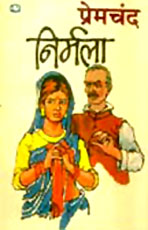 The poignant novel Nirmala by Premchand was first published in 1928. Nirmala is a classic narrative of women as a victim, based on the theme of a young girl married to an elderly person. The sensitive novel, "Nirmala" is a psychological probing of the individuals in the pre-independence era. "Nirmala" is the representation of realism in fiction - the stark realism, spontaneous yet natural, which cannot be subdued by the ethical and moral chains. Relating a story, Nirmala is an infliction to the corrupted patriarchal society, which with the passage of time happens to be the universal story of the women even in the modern days. The novel explores risky and senstitive areas with a reformist outline.
The poignant novel Nirmala by Premchand was first published in 1928. Nirmala is a classic narrative of women as a victim, based on the theme of a young girl married to an elderly person. The sensitive novel, "Nirmala" is a psychological probing of the individuals in the pre-independence era. "Nirmala" is the representation of realism in fiction - the stark realism, spontaneous yet natural, which cannot be subdued by the ethical and moral chains. Relating a story, Nirmala is an infliction to the corrupted patriarchal society, which with the passage of time happens to be the universal story of the women even in the modern days. The novel explores risky and senstitive areas with a reformist outline.
Synopsis:
Nirmala, based on the background of pre-independence, delineates the story of a young and vulnerable 15 year old girl, named Nirmala. Wrecked with poverty, the parents of Nirmala could not afford to pay the amount of dowry and she was married to an elderly widower who was 20 years older than her. Totaram had three sons from his earlier marriage, who are around Nirmala`s age. In due course of time, Nirmala falls in love with the eldest son and the forbidden relationship between Nirmala and Totaram`s son inevitably grows. However the jealous husband of Nirmala perceives this adultery long before Nirmala and his step son do anything and he separated them tragically. As the young man dies in a denunciatory illness, Nirmala is tormented by her culpability in his death and her final catastrophe in the family.
The novel "Nirmala" entirely deals about the life and activities of Nirmala. Nirmala as a protagonist and as a victim conveys a sensitive issue, which communicates a sense of tragedy rather than moral disapproval. The title clearly signifies the essential theme, the novel "Nirmala" is concerned about. Moreover "Nirmala", though is perceived as a progressive indictment to the debased patriarchal society, it enables the readers to have an insightful idea about the prehistory of `feminist` thinking in India.



















